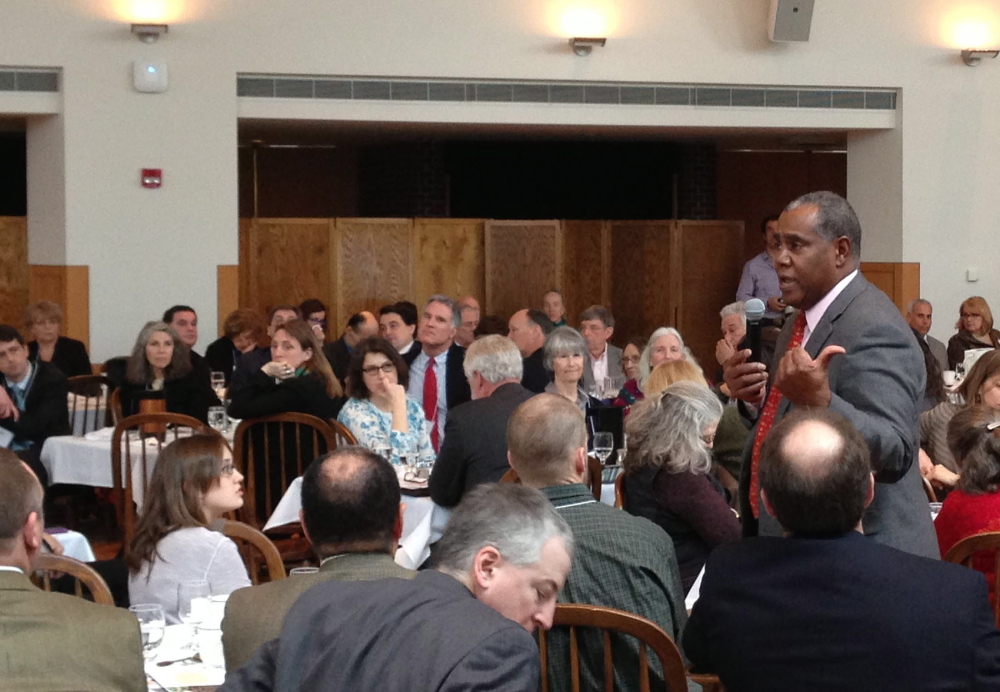BRUNSWICK — Federal, state and local regulations designed to protect the environment are necessary, but they shouldn’t be considered the foremost way to establish sustainable business practices, according to Steve Curwood, the host of the popular public radio show “Living on Earth.”
“Regulation is really the court of last resort,” said Curwood, who presented the keynote address Tuesday morning to about 300 people at Coastal Enterprises Inc.’s annual meeting at Bowdoin College.
Having community and business leaders embrace sustainable business practices is a mission that needs to be pursued long before the regulations come into play, said Curwood, who lives on a small woodlot in southern New Hampshire.
“People need to know what the rules are out there, but good parents don’t get up every day and say, ‘Look, Johnny. I want to make sure you’re not a bank robber,’ because it’s all about getting the ethics, building the values, understanding the connections,” Curwood said. “If you try to micromanage within those industries, you’re going to make stupid decisions because everybody’s situation is different, every industrial process is different. What you want to do is encourage people doing those processes to do them sustainably. If I make this product, at the end of the day is this going to be sustainable or not?”
Curwood’s speech covered what he called the “Three C’s” – creatures, chemicals and climate change.
He said his argument boiled down to people – and society in general – needing to be more cognizant of the way humans affect their surrounding ecosystem.
“Everything is connected,” Curwood said, including the creatures humans coexist with, the chemicals humans produce, and climate change, which most people agree has been caused by human activity. He noted that there are 80,000 synthetic chemicals on the market today, only a handful of which have been properly tested.
Curwood discussed Maine’s lucrative lobster fishery and how rising temperatures in the Gulf of Maine could affect it.
“I love lobster and I’m concerned that lobster has already disappeared from the Long Island area and you’re under pressure here,” he said. “We know what our mission is: We need to take care of the creatures that have evolved along with us.”
He said these issues are not ones to be addressed in the future.
“It’s with us today,” he said. “To be fair to (the next generation), we need to take action now so this place is at least as wonderful a place for them as it is for us.”
Curwood was in Maine at the invitation of CEI, a not-for-profit community development organization based in Wiscasset that works to funnel capital to companies working on renewable energy projects, among other things.
“We’re looking at climate issues from the standpoint of what can we invest in to re-create and rebuild the world,” Ron Phillips, CEI’s CEO, said in an interview after the event. “We’re small. The world is a big place, and the issues that need to get handled here need to get handled on an international and high level. We know that, but we can make a contribution here in Maine.”
CEI also presented its annual awards Tuesday morning. The organization presented the Partnership Award to Maine Community Health Options, a nonprofit health insurance cooperative; the Sustaining Community Award to lobster processor Maine Fair Trade Lobster; and the Founder’s Award to Annee Tara, a member of CEI’s board.
Whit Richardson can be contacted at 791-6463 or at wrichardson@pressherald.com
Send questions/comments to the editors.



Success. Please wait for the page to reload. If the page does not reload within 5 seconds, please refresh the page.
Enter your email and password to access comments.
Hi, to comment on stories you must . This profile is in addition to your subscription and website login.
Already have a commenting profile? .
Invalid username/password.
Please check your email to confirm and complete your registration.
Only subscribers are eligible to post comments. Please subscribe or login first for digital access. Here’s why.
Use the form below to reset your password. When you've submitted your account email, we will send an email with a reset code.